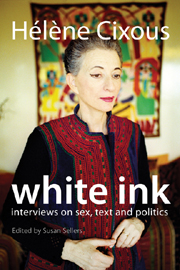Book contents
- Frontmatter
- Contents
- Acknowledgements
- Editor's note
- Preface: On being interviewed
- Part I Writing the enigma
- Part II Writing the feminine
- Part III Writing and politics
- Part IV Writing and theatre
- Part V Writing roots
- Part VI On painting, music and nature
- Part VII Dialogues
- 14 On Marguerite Duras, with Michel Foucault
- 15 From the word to life, with Jacques Derrida
- Envoi: But the Earth still turns, and not as badly as all that
- Bibliography of Hélène Cixous's works
- Index
15 - From the word to life, with Jacques Derrida
from Part VII - Dialogues
- Frontmatter
- Contents
- Acknowledgements
- Editor's note
- Preface: On being interviewed
- Part I Writing the enigma
- Part II Writing the feminine
- Part III Writing and politics
- Part IV Writing and theatre
- Part V Writing roots
- Part VI On painting, music and nature
- Part VII Dialogues
- 14 On Marguerite Duras, with Michel Foucault
- 15 From the word to life, with Jacques Derrida
- Envoi: But the Earth still turns, and not as badly as all that
- Bibliography of Hélène Cixous's works
- Index
Summary
This interview first appeared as “Du mot à la vie: un dialogue entre Jacques Derrida et Hélène Cixous”, in Magazine Littéraire 430 (April), 22–9, 2004. This translation was published as “From the Word to Life: A Dialogue Between Jacques Derrida and Hélène Cixous”, New Literary History 37(1), 1–13, 2006.
aa You have agreed to participate in an oral interview: Hélène Cixous has written about the danger of the “spoken word” with regards to “thinking”. The voice also plays a role here: it has an important place in both of your texts.
derrida Those who do not read me reproach me at times for playing writing against the voice, as if to reduce it to silence. In truth, I proposed a re-elaboration and a generalization of the concept of writing, of text or of trace. Orality is also the inscription [frayage] of a trace. But the serious treatment of these problems requires time, patience, retreat, writing in the narrow sense. I have difficulty improvising about the questions which count the most for me. Our three voices are setting out on a formidable and singular exercise here: to give each other the floor [la parole], to let each other speak in order to trace out an unpredictable path. Our words should form more than one angle, they should triangulate, play at interrupting each other even while they are articulated together.
- Type
- Chapter
- Information
- White InkInterviews on Sex, Text and Politics, pp. 166 - 179Publisher: Acumen PublishingPrint publication year: 2008



